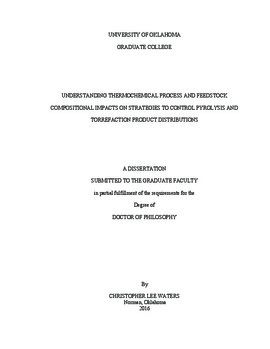| dc.contributor.advisor | Lobban, Lance | |
| dc.contributor.author | Waters, Christopher | |
| dc.date.accessioned | 2016-05-04T18:50:52Z | |
| dc.date.available | 2016-05-04T18:50:52Z | |
| dc.date.issued | 2016-05-13 | |
| dc.identifier.uri | https://hdl.handle.net/11244/34545 | |
| dc.description.abstract | Growing concern about the effects of post-Industrial revolution fossil carbon dioxide release has led to large-scale research efforts to understand how to address and mitigate future fossil CO2 emissions. Within the scope of products and services that have been enabled by the extraction of fossil hydrocarbon sources, those that rely on energy release by combustion – that is, electricity generation and transportation fuels – are considered the primary culprit in the observed increase of atmospheric CO2 levels. While various mature technologies exist for the generation of electrical power without the need for combustion of coal, natural gas, or liquid fuels, there are significantly more difficult engineering challenges involved in supplying so-called “zero emission” or “carbon neutral” energy storage solutions for transportation which can displace petroleum-based products.
Numerous studies point to the possibility of displacing or replacing petroleum use for transportation fuels via the industrial production of liquid fuels from thermochemical conversion of biomass. As biomass can be a renewable and sustainable non-fossil source of organic molecules, it is hypothesized that it is possible to develop conversion strategies and technologies that allow society to retain the advantages and existing infrastructure associated with liquid hydrocarbon fuels without the associated fossil CO2 release. However, barring extensive regulatory requirements, any biomass-based technologies that seek to displace petroleum on a wide scale must be economically viable. For liquid biofuels, lowering processing costs and improving total fuel yields per acre are some of the significant engineering challenges that hinder economic viability.
In this contribution, we consider the effects of changing various process conditions during biomass conversions, as well as develop an understanding of what compositional features of the biomass are most important to the resulting thermochemical product distribution. By understanding how and why the process conditions and the biomass feedstock compositions affect the resulting thermochemical product distribution, parallel development of feedstocks and processes tailored for those feedstocks can occur. This combined approach may help accelerate progress towards more viable biofuels production and therefore help accelerate petroleum displacement in transportation fuels. | en_US |
| dc.language | en_US | en_US |
| dc.subject | pyrolysis, chemical engineering, biology | en_US |
| dc.title | Understanding Thermochemical Process And Feedstock Compositional Impacts On Strategies To Control Pyrolysis And Torrefaction Product Distributions | en_US |
| dc.contributor.committeeMember | Bartley, Laura | |
| dc.contributor.committeeMember | Crossley, Steven | |
| dc.contributor.committeeMember | Mallinson, Richard | |
| dc.contributor.committeeMember | Wang, Bin | |
| dc.date.manuscript | 2016-04-27 | |
| dc.thesis.degree | Ph.D. | en_US |
| ou.group | College of Engineering::School of Chemical, Biological and Materials Engineering | en_US |
